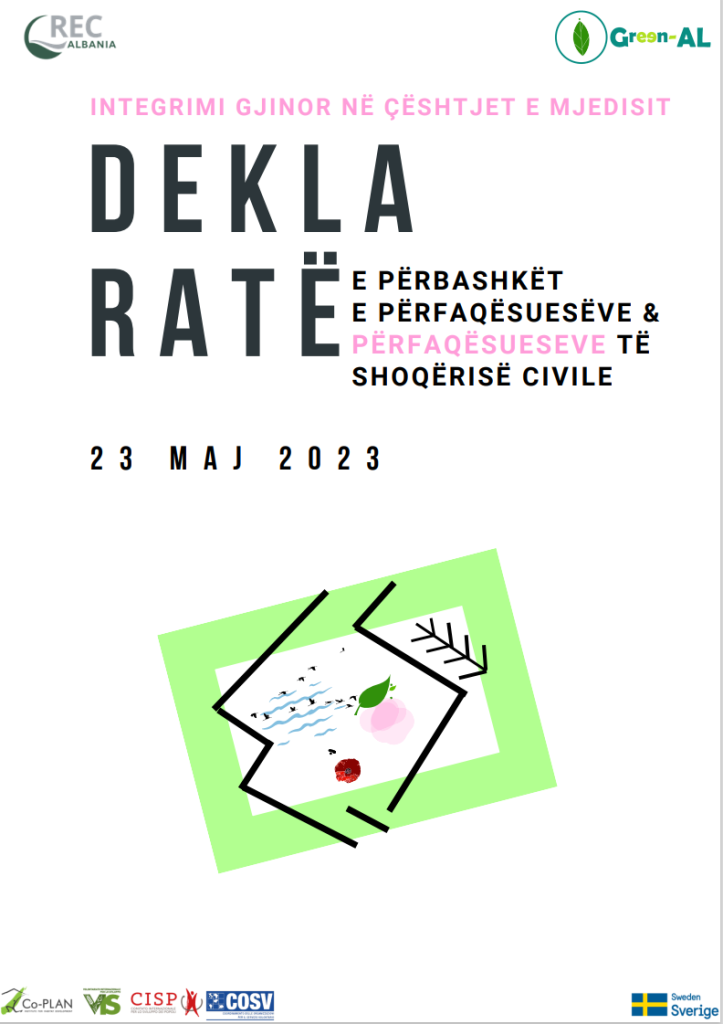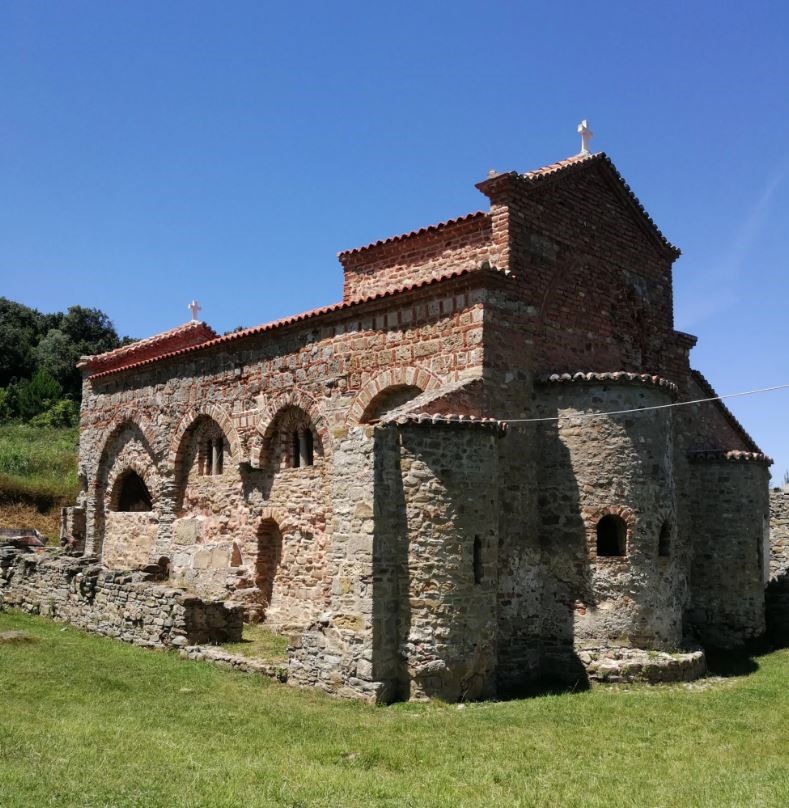We, representatives of Civil Society Organizations and academic-research institutions contributing to the field of gender mainstreaming in environmental and climate issues, convened on May 23, 2023, in Tirana for the Forum: “Gender Mainstreaming in Environmental Causes 2023.” During this event, we engaged in discussions regarding the interaction between gender and the environment, recognizing it as a transformative imperative for the country’s policies. Our discussions encompassed several key topics, including the development of national environmental policies that incorporate a gender perspective and are sensitive to the needs of the most vulnerable groups, the empowerment of women in rural areas to address inequalities, and the perception about gender in the environmental context. Gender mainstreaming, an approach to policy-making that acknowledges the interests and concerns of both women and men, has gained increased significance in areas such as pollution, disaster risk reduction, natural resource management, and rural development. While efforts have been made in Albania to tackle gender-related challenges in these domains, more action is necessary to ensure the active participation and leadership of women and girls in decision-making, development, management, and implementation processes. – Gender mainstreaming in environmental policy The Albanian environmental legal framework has undergone a highly dynamic process of completion and development. However, it is still far from being comprehensive and aligned with the European Union’s acquis communautaire. While political documents and environmental strategies acknowledge the impact on people, they lack sensitivity to gender considerations. The assessment of pollution or environmental damage primarily focuses on the overall population, without considering the unique circumstances of different demographic groups. National strategies such as those addressing Climate Change, Integrated Waste Management, Biodiversity, Energy, and others fail to mention the specific impacts on various population groups, such as women and girls, youth, elderly individuals, persons with disabilities, and the intersections between these groups. Furthermore, these strategies lack gender-specific indicators to measure the impact of proposed measures. On the flip side, the framework of policies and strategies aimed at promoting gender equality has been supplemented with distinct environmental indicators, primarily focused on climate change, natural disaster risks, and access to natural resources, among others. However, the absence of disaggregated data based on sex and gender statistics often hinders complete and comprehensive reporting on the country’s progress and achievements in this field, particularly in international platforms. The process of European integration and the commencement of negotiations for Chapter 27, titled “Climate and Environment,” will further emphasize the importance of evaluating the impact of environmental policies on gender equality across all environmental domains. However, the limited capacity and lack of expertise within responsible institutions to analyze and determine the gender dimensions, along with prevailing gender stereotypes, inequalities, and multiple forms of gender discrimination in Albanian society, pose challenges to effectively integrating gender into environmental policies and programs. – Natural Resource Management Gender mainstreaming is crucial in natural resource management to ensure sustainable development and prevent the indiscriminate exploitation of resources. Although efforts have been made in our country to address gender integration challenges, particularly in terms of gender indicators, the participation of women in the planning, drafting, and execution processes remains low. A study conducted by NEXUS , with the support of UNECE, highlights the exclusion of women from decision-making processes related to natural resource management. Consequently, their specific needs and priorities are often overlooked. Women and girls in Albania may encounter significant barriers in accessing resources and information concerning natural resource management due to social and cultural norms, as well as the gender stereotypes related to property rights, employment opportunities, and involvement in community-level decision-making. One of the significant challenges related to gender inequality pertains to land ownership and access to natural resources. According to a report by the Organization for Economic Co-operation and Development (OECD), women, particularly those residing in rural areas of Albania, face disadvantages and exclusion from land ownership and inheritance rights. These circumstances limit their ability to participate in natural resource management and other economic activities. In response to these challenges, numerous initiatives have been undertaken to promote gender-sensitive natural resource management (NRM) in Albania. Civil society organizations and foreign aid programs have developed policies and programs aimed at enhancing women’s involvement in decision-making processes related to NRM. These entities actively advocate for gender-responsive approaches. – Rural Development and Green Enterprises Rural development and green entrepreneurship are crucial areas where gender mainstreaming is essential for promoting sustainable development and reducing poverty. In Albania, women encounter accentuated challenges when it comes to accessing resources and opportunities related to rural development and green entrepreneurship. A study conducted by the Food and Agriculture Organization (FAO) reveals that women in Albania are frequently excluded from decision-making processes in rural development and face limited access to financial instruments. Moreover, they may encounter greater obstacles in accessing training and information focused on green entrepreneurship and sustainable agriculture. Despite women’s significant involvement in agriculture and their contribution to land and production, they are often excluded from ownership and decision-making roles . They are commonly perceived as “farmers’ wives” rather than recognized as farmers themselves. Even in cases where women assume the role of farm managers, it is typically a temporary position resulting from circumstances, such as husbands leaving due to emigration or passing away. Their leadership positions are not fully acknowledged in legal aspects. There are only a few instances where women obtain inheritance certificates or land use permits in their own names. Furthermore, women’s scientific knowledge regarding cultivation techniques, the use of modern equipment, and other agricultural aspects remains low or is undervalued. Economic difficulties that often accompany women farmers, coupled with multiple forms of gender discrimination, pose significant obstacles to adopting modern and efficient methods of land management, water irrigation, and more. – Energy and Renewable Energy Use In general, there is an almost complete lack of data regarding gender mainstreaming in energy policies and legislation. The inclusion of the gender perspective in the domains of energy, energy efficiency, and energy poverty is still in its Additionally, there is a notable absence of consideration for energy poverty in health, economic, and social welfare policies and legislation, as well as a lacking connection to gender equality. The lack of attention to the intersection between gender and energy poverty in the relevant policies and actions related to gender equality, climate change, energy, health, and social welfare seems to stem from a lack of knowledge and understanding of the link between gender equality and energy poverty. Furthermore, discussions surrounding the use of alternative energy sources, such as renewable energy, often neglect to address gender disparities. As a result, women farmers face significant barriers in accessing and utilizing alternative resources like solar energy, voltaic farms, and mobile solar panels for irrigation. This exclusion is also a consequence of what has been dubbed as the feminization of poverty. In many cases, it is women and children who are involved in late-night land irrigation processes, often in areas devoid of street lighting and with poorly developed infrastructure, increasing their vulnerability and safety risks in public spaces. – Disaster Risk Reduction (DRR) Disasters pose a significant threat to Albania, particularly in light of the influence of climate change and its impact on the country’s vulnerability to natural hazards. While efforts have been made to address gender-related challenges within the framework of disaster risk management, women and girls continue to encounter unique obstacles. We acknowledge the progress made in addressing gender-related challenges within the context of framework in Albania, over the past year. Moreover, women and girls in Albania are disproportionately affected by disasters due to social and economic factors. They are more likely to experience poverty, have limited access to resources and information, and reside in vulnerable living conditions, such as informal settlements or remote rural areas. Consequently, they may encounter greater difficulties in accessing essential services and resources crucial for survival in the aftermath of a disaster. REC Albania has actively participated in the review process of the preparatory and consultative phase of the National Strategy for Disaster Risk Reduction (NSDRR 2023-2030), which was approved on February 25, 2023. With the support of the UN Women’s national office and SIDA, REC Albania has been engaged in activities at the local level, involving women, girls, young people, and other representatives of vulnerable groups. The objective has been to incorporate gender considerations into national and local plans within the framework. During the National Forum, discussions highlighted the challenges faced by women and girls in Albania, including inequalities, gender stereotypes, and various forms of gender and multiple discrimination. These factors directly impact societal development, hinder security, and limit opportunities for employment, education, and participation in decision-making processes at both the national and local levels. In order to improve this situation and advance towards gender equality and the sustainable development of a just society, the following recommendations are put forth: 1. The review of environmental strategic documents should be conducted with a gender-sensitive approach, giving careful consideration to the extent of gender inequality across all environmental sectors. This includes evaluating resource management practices, examining the impact of environmental issues on vulnerable groups at both national and community levels. Additionally, this thorough assessment should extend to the field of education and the development of human resources involved in resource administration at all levels of government. 2. Clear gender indicators should be incorporated into Action Plans for the implementation of various environmental strategies, programs, and projects in a comprehensive and interconnected manner with their monitoring plans. These indicators should strive to address gender inequalities, not only in terms of quantity – by increasing the participation of women and girls, but also in terms of quality, ensuring that the impact leads to tangible improvements in their circumstances. It is crucial to consider the specific needs and intersecting identities of these groups in order to bring about meaningful advancements in their overall well-being. 3. Addressing gender inequalities in natural resource management is paramount for the sustainable development of the country. By promoting equal rights, participation, and decision-making power for women, we can foster more inclusive and effective governance of resources. This approach not only enhances the resilience of communities and ecosystems but also taps into women’s knowledge, skills, and perspectives, contributing to the sustainable use and conservation of natural capital. 4. Considering the link between natural capital and economic independence, it becomes apparent that this connection can greatly impact entrepreneurship in rural development and green businesses. Women in rural areas often face barriers to accessing education and skills training, limiting their ability to engage in green entrepreneurship and take advantage of opportunities within the green economy. To address this, efforts should be intensified to ensure the effective implementation of rural women’s property rights and provide them with educational and training opportunities, enabling their inclusion and contribution to the environmental economy. Effectively implementing women’s property rights and harmonizing resources requires coordination among environmental and gender specialists and experts within and across institutions, NGOs, and international organizations. 5. A gender-sensitive analysis of the waste management process is crucial, considering that women and girls often bear the responsibility for household waste management. This role has broader implications, including their educational and awareness-raising influence on other family members. It is essential to emphasize not only hygiene standards but also waste reduction through reuse and source separation for recycling. By involving women in decision-making processes related to waste management, their capacity to influence policies and practices that impact local communities is enhanced. 6. Developing a deeper understanding of the impact of climate change on all segments of society is essential for creating more effective adaptation plans and building resilient communities. Women and girls, across various groups, are often disproportionately affected by climate change and natural disasters due to entrenched social roles and responsibilities that have not evolved to meet the challenges of development. Limited access to resources and decision-making power makes it difficult for them to prepare for, respond to, and recover from disasters. Consequently, local and national plans should be prepared and implemented with a clear focus on empowering women and vulnerable groups, enabling them to effectively mitigate the risks posed by natural disasters. 7. The collection, analysis, and ongoing utilization of sex-disaggregated data, gender statistics, and gender-sensitive indicators in all environmental documents and interventions are crucial. This ensures accurate measurement of progress and enables effective addressing of the problems and challenges encountered in promoting gender integration. By creating appropriate conditions for sustainable development, these efforts contribute to the overall success of environmental initiatives. 8. Organizing public debates on energy poverty and its intersectionality with gender and multiple belonging is crucial. These discussions will not only increase awareness and knowledge but also facilitate the development of a comprehensive definition of energy poverty through a gender lens. This is a requirement in the National Climate and Energy Plan and necessitates a cross-sectoral perspective. Integration of specific costs and budgets across all dimensions of energy security activities is essential. It should be considered during the Gender Responsive Budgeting process at both the local and national levels. When discussing the use of alternative energy sources and implementing related legislation and policies, it is imperative to consider the gender dimension and the impact of multiple belonging. Access to these resources must be enabled for women from all groups in society, ensuring their full and fair participation. 9. Giving priority to the inclusion of women and girls from all groups in decision-making processes related to disaster risk reduction, natural resource management, rural development and green entrepreneurship, and waste management is crucial. This not only addresses the challenges mentioned above but also advances the necessary steps for Albania’s integration into the EU and the country’s progress in achieving the Sustainable Development Goals. 10. Harmonizing resources, actions, interventions, and gender and environmental policies within public and non-public institutions, civil society organizations, and international organizations is another important step. This coordination will facilitate the proper implementation of all the aforementioned recommendations. Achieving environmentally friendly policies that guarantee the right of citizens to live in a healthy environment requires the integration of policies and programs that promote gender equality, women’s empowerment, and capacity building for women and girls from all groups in society. This includes combating discrimination and addressing multiple disadvantages. Furthermore, raising awareness and promoting education on gender and multiple identity issues is crucial to ensure the full participation of women and girls from all groups in addressing climate change and harnessing the opportunities created by green economy programs. This declaration is supported and approved by: 1. Qendra Burimore e Mjedisit në Shqipëri (REC Shqipëri) 2. Instituti për Zhvillimin e Habitatit (Co-Plan) 3. Shoqata Italiane e Bashkëpunimit për Zhvillim (COSV) 4. Qendra Aleanca Gjinore për Zhvillim (GADC) 5. Shoqata “Delfini” Dibër 6. Shoqata “Unë, Gruaja” Pogradec 7. Shoqata “Udhëtimi i Lirë”, Durrës 8. AlbContact Center 9. Klubi Ekologjik Elbasan 10. Organizata Holandeze për Lidhjen Ndërmjet Njerëzve dhe Vlerave të Natyrës (CNVP) 11. Milieukontakt Shqipëri 12. Organizata Italiane e Vullnetarizmit Ndërkombëtar për Zhvillim (VIS Albania) 13. Komiteti Ndërkombëtar për Zhvillimin e Popujve (CISP Albania) 14. Qendra Shqiptare për Qeverisjen Mjedisore (ACEG) 15. Qendra “Të Drejtat e Njeriut në Demokraci” (HRDC) 16. Partnerët Shqipëri për Ndryshim dhe Zhvillim (Partners Albania) 17. Shoqata e Bashkuar Agro – Mjedisore (Agri-EN) 18. Instituti për Ndryshim dhe Lidership në Shqipëri (INLSH) 19. Shoqata “Pylli i Blertë”, Pogradec 20. Shoqata “Korça Alpin” 21. Qendra Mjedisore për Zhvillim, Edukim dhe Rrjetëzim (EDEN) 22. Qendra për Zhvillim Komunitar “Sot për të Ardhmen” 23. World Vision Albania 24. Rrjeti i Fuqizimit të Gruas në Shqipëri (AWEN) 25. Ilir Zgjani (LAG Coordinator, Pogradec) 26. Luka Grabocka (Representative of “Korça Alpin”) 27. Meme Xhaferaj (Social Service, Municipality of Durrë) 28. Elona Dhëmbo (National Expert on Gender Issues) 29. Monika Kocaqi (National Expert on Gender Issues) 30. Rudina Basha (NJVKSH Tirana) 31. Klea Maliqi (Independent Expert) 32. Denada Prenga (Student) 33. Donila Pipo (Lawyer)





